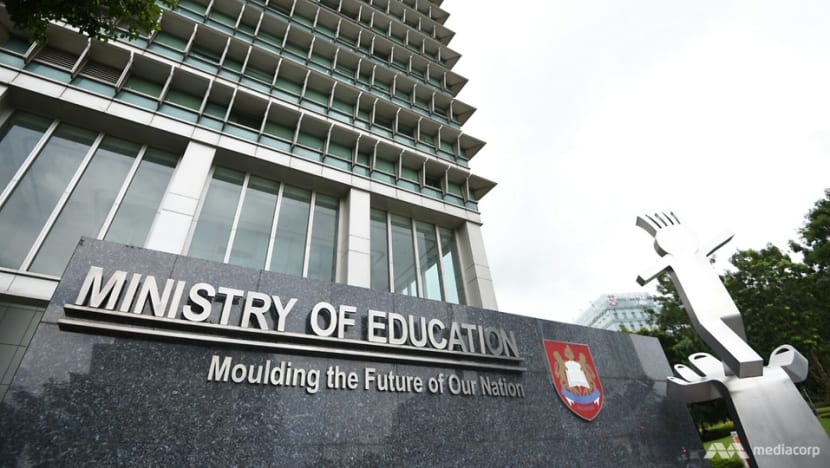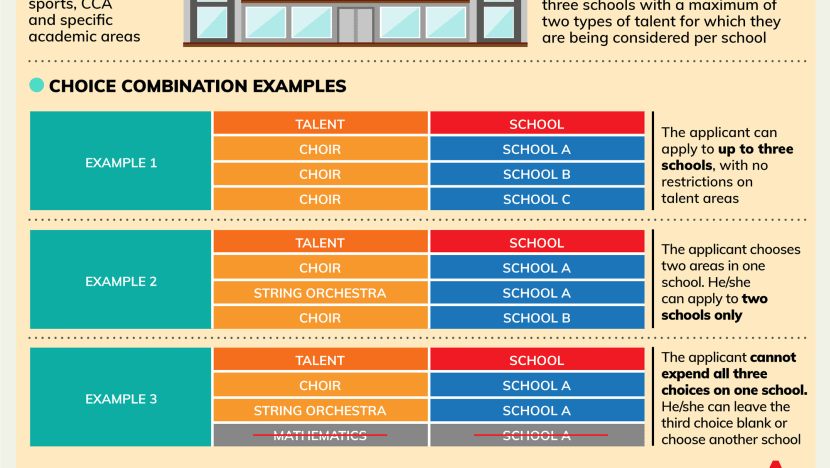New Direct School Admission portal to be launched next year to simplify application process

The Ministry of Education building. (File photo: Ngau Kai Yan)
SINGAPORE: Students applying to secondary schools through the Direct School Admission (DSA) exercise will be able to do so online from 2019.
Making the announcement on Thursday (Nov 8), the Ministry of Education (MOE) said it is streamlining the DSA application process with the launch of a centralised online portal in 2019.
MOE said the application process was simplified in order to encourage students to tap on the expanded DSA opportunities. It added that it hopes to encourage more students with talents and potential to opt for the DSA, regardless of their family backgrounds.
Speaking to the media on the sidelines of an arts education conference, Second Minister for Education Indranee Rajah noted that while the portal will make the process easier and more convenient for all applicants, it will have an added benefit for those who come from less advantaged backgrounds.
“For families that come from more disadvantaged backgrounds, especially parents who are not so conversant with how to go about applying (for DSA), it’s very difficult when you have to go to different schools and make different applications,” she said.
“So it is our assessment that having an online portal also helps those from less advantaged backgrounds as it just simplifies the process.”
The announcement comes on the back of earlier announcements about the scheme. In 2017, then-Education Minister (Schools) Ng Chee Meng announced that the number of DSA places would be expanded.
From this year, all secondary schools can now admit up to 20 per cent of their non-Integrated Programme Secondary 1 intake via the DSA. This is an increase from 5 per cent for schools with distinctive programmes, and 10 per cent for autonomous schools.
READ: DSA to exclude general academic tests as criteria by 2018
As a result, more students were able to gain admission through the scheme. This year, which is the first year of this expansion, 3,000 students received confirmed offers from schools, compared to 2,500 in 2017.
Ms Indranee said that the simplification of the application process is part of her ministry’s efforts to bring out the potential in every child. “There are some children whose parents are more able to access the different choices, and they have more resources, so this is one of the ways in which we are enabling those with fewer resources, by making it easier for them to apply,” she said.
When asked if the ministry has been seeing more students of a higher socioeconomic class being admitted to schools through the scheme, Ms Indranee responded that those who are “better resourced” have a greater ability to find out – and apply – more. “Those who come from disadvantaged backgrounds may not be as well-informed of some of the choices available,” she said. “So what we’re really trying to do is close the gap, and make sure those less well-advantaged still have the opportunity to apply.”
Ms Indranee noted that DSA selection processes have been refined with a set of selection principles, which are meant to help schools identify the potential in students even if they may not have had the opportunity to demonstrate their talent yet.
“For example, during the selection for Arts DSA, schools will look out more for potential ability - such as a sense of rhythm, an eye for aesthetics, or the ability to sing in tune - and place less emphasis on whether the child has gone for many competitions or won awards locally or overseas,” she said.
She added that all schools, including those offering the Integrated Programme, have refined their selection processes to be more judicious in identifying and recognising potential and specific talent.
“One positive change is that schools no longer administer general academic ability tests during their DSA selection,” she said. “Doing so brings our schools’ DSA process and objectives back to the original intention of recognising specific talents, not general academic talents.”
NO MORE APPLICATION FEES
The DSA scheme was first introduced in 2004 to allow students with non-academic talents to secure a place in secondary schools even before they sit for the Primary School Leaving Examination.
Students will be able to use a common application form to apply to multiple schools. Currently, parents and students have to submit hardcopy applications individually to schools, which may have differing application deadlines.
Students may apply through the portal using one of their parents’ SingPass login.
With the portal, MOE said all schools will have a common application timeline, with the exception of the Singapore Sports School and School of the Arts, which will still require students to apply directly to them due to their unique admission requirements.
Next year’s exercise will run over a four-week period from May 8 to June 4.
READ: Poly grads applying for NUS, NTU won’t have O-Level grades considered from 2020
Upon application through the portal, a student’s official data – including school results and co-curricular activity records – will be shared directly with the secondary schools that the student has applied to. This eliminates the need for students to submit hardcopy documents to each of the individual schools, and for the various secondary schools to expend additional effort verifying the documents.
Application through the portal will also be free-of-charge. Currently, some schools charge an administration or test fee, ranging from S$20 to S$50. The fees, said MOE, were meant to recover costs from DSA administration and selection. Most of these schools waived the fees for students who had financial difficulties, MOE added.
However, while students could previously apply to as many schools and talent areas as they wanted, there will now be a limit of three schools and three talent areas for each student. Students may apply for up to two different talent areas from the same school.

MOE said the limit of three choices will encourage students and parents to consider their DSA selection judiciously, and “manage the time and effort” participating in multiple DSA trials and interviews. It added that based on past application data, more than 90 per cent of students already apply to three or fewer schools.












